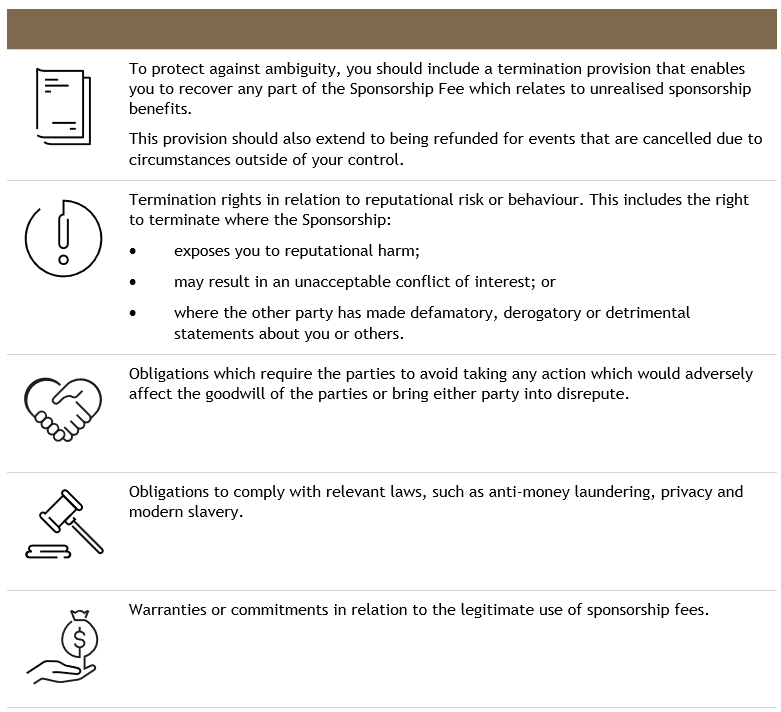Caroline Hayward and Mia Judkins discuss protecting your brand and reputation in sponsorship agreements. Organisations are often focussed on the benefits stemming from sponsorship arrangements, whereas brand or reputational issues may arise down the track. This article considers practical ways to safeguard against such issues. Read on for the latest in KWM’s inhouse-centred series: From our inhouse to yours.
Sponsorship arrangements are a way for parties to secure benefits such as enhanced brand visibility and promotional materials, access to wider networks and business connections in exchange for financial support or in-kind contributions. However, they can carry certain risks, particularly reputational risk and risks in relation to misuse of intellectual property.
What is a Sponsorship Agreement?
A sponsorship agreement is a contract between a Sponsor and a Sponsorship Recipient, which outlines the terms of the contributions to be provided by the Sponsor, and the benefits that the Sponsorship Recipient will grant the Sponsor in return. Contributions from a Sponsor will often take the form of financial payments, such as a lump-sum payment or ongoing instalments. However, they can also take the form of in-kind contributions, which are non-monetary, such as the provision of goods, services or expertise.
Defining Sponsorship Benefits
In return for their contributions, the Sponsor can receive unique and tailored benefits. The sponsorship agreement should clearly define the sponsorship benefits and provide sufficient detail to clearly set out the rights and benefits that the Sponsor will receive in exchange for providing sponsorship. ‘Sponsorship Benefits’ can be set out in the definitions of the agreement, detailed a schedule to the agreement, or in a separate table of Sponsorship Benefits. These benefits are unique to the sponsorship arrangement, but some common examples include access to specific networks, brand visibility such as the placement of the Sponsor’s name or logo on signage or publications, or promotion at a specific event or multiple occasions over the sponsorship term.
Defining the Term of the Sponsorship Agreement
It is important to consider and define the term of the sponsorship and how payments are to be made during the term of the arrangement. Will it be a one-off event involving payment of a lump sum, or will payments be made in stages as different sponsorship benefits arise? Will in-kind contributions be granted for a specific period of time? Have you checked whether there are any terms which may trigger an automatic renewal of the sponsorship? These are all questions to have in mind when considering the term of the sponsorship agreement.
It is important to note that if the sponsorship benefits relate to a specific event that is to take place during the sponsorship term, you should provide sufficient details regarding the timing of the event in the contract. If an event date has not been fixed, then include a line to the effect of “the Event date will be agreed with the Sponsor and must be held during the Term”.
Protecting Intellectual Property in the Sponsorship Agreement
Sponsorship benefits will often involve promotional activities by the Sponsorship Recipient which feature the Sponsor’s brand name and logo. With the increasing popularity of digital advertising, we are seeing a rise in sponsorship promotion through online platforms such as social media posts. It is important in this changing landscape that sponsorship agreements contain carefully crafted intellectual property (IP) clauses to protect your brand.
To ensure that the IP of the Sponsor is protected, it is crucial that the scope of the IP usage is clearly outlined in the sponsorship agreement. This should include narrowing the scope of the IP clause to ensure that IP can only be used for the sole purpose of providing the sponsorship benefits as expressly permitted under the agreement, or to which the Sponsor consents to in writing. You should also ensure that the licence granting the right to use the IP is revocable and non-sublicensable.
You can also add an additional obligation requiring the Sponsorship Recipient to submit a copy of the material containing your name or logo to you for written approval prior to the material being published.
How to Manage Reputational Risk in Sponsorship Agreements
Sponsorship arrangements can carry reputational risk, especially where your brand is being publicly endorsed and promoted by a third party. With increased scrutiny of governance, environmental and ethical issues, brand reputation can be damaged merely by association. Unclear termination clauses may lead to disputes over the sponsorship benefits, for example what happens if the Sponsorship Recipient is paid the sponsorship fee in a lump-sum at the beginning of the term, then fails to deliver the sponsorship benefits? This highlights the importance of not only carefully selecting your sponsorship partner, but also carefully drafting your agreements to protect your reputation if things go south.
The below table outlines protections that you should consider when entering into a sponsorship agreement:

Further information
If you need further guidance on sponsorship agreements, please reach out to your KWM contact or Kirsten Bowe.
Check out other insights from the Office of General Counsel team here and subscribe to KWM Pulse using the button below to stay across upcoming articles in areas of interest.









